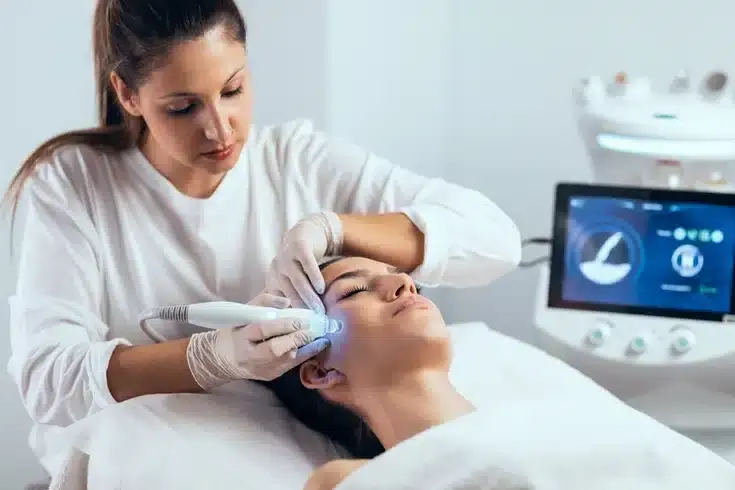Ministry of Health, Labour and Welfare Notification in June of Reiwa 6 (2024): Application of the Medical Practitioners' Law to HIFU Treatments at Beauty Salons and Similar Establishments

HIFU treatments, known for their effectiveness in improving wrinkles and sagging skin, have gained popularity. However, with an increase in post-treatment complications in recent years, the Ministry of Health, Labour and Welfare issued a notice on June 7, Reiwa 6 (2024). Many beauty salons that advertise HIFU treatments for lifting and other benefits may find themselves in need of prompt action.
This article provides a clear explanation of the new regulations and penalties associated with HIFU treatments. To ensure compliance with the law and to provide safe treatments, it is crucial to review the contents of this notice and respond appropriately.
What is HIFU Treatment?
HIFU (High Intensity Focused Ultrasound) is a cosmetic procedure that involves concentrating ultrasound waves to a single point to heat targeted areas of the skin or fat tissue. It is known to be effective in improving wrinkles, sagging, and smile lines, and has gained popularity in recent years.
While HIFU is a popular treatment for reducing wrinkles and sagging, there has been an increase in complications following the procedure. It has been recognized that treatments performed by individuals without proper knowledge and skills can lead to serious risks such as burns and nerve damage. In fact, there have been numerous reports of incidents where HIFU treatments have caused acute cataracts, nerve paralysis, and other injuries.
Reference: Japanese Consumer Affairs Agency | Accidents Caused by HIFU at Beauty Salons[ja]
HIFU Treatments Without a Medical License Constitute Illegal Activity
Based on the Japanese Ministry of Health, Labour and Welfare Medical Affairs Bureau Notification No. 0607 (dated June 7, Reiwa 6 (2024))[ja], HIFU treatments performed by individuals without a medical license may constitute a violation of the Medical Practitioners’ Act.
HIFU treatments fall under the category of actions that “should not be performed by anyone other than a physician due to the risk of harm to health and hygiene,” as stipulated in Article 17 of the Medical Care Act. Specifically, there is a risk of serious side effects such as burns and nerve damage.
If an individual without a medical license performs HIFU treatments, they may be subject to punishment under Article 17 of the Medical Practitioners’ Act, which includes imprisonment for up to three years or a fine of up to one million yen.
Article 31: A person who falls under any of the following items shall be punished by imprisonment for not more than three years or a fine of not more than one million yen, or both.
e-Gov|Medical Practitioners’ Act[ja]
1. A person who has violated the provisions of Article 17.
2. A person who has obtained a medical license based on false or fraudulent facts.
2. If the person who committed the crime under the preceding paragraph used the title of physician or a similar name, the punishment shall be imprisonment for not more than three years or a fine of not more than two million yen, or both.
HIFU Treatments Can Only Be Performed in Medical Facilities
HIFU treatments are mandated to be performed exclusively in “medical facilities” as defined in Article 1, Paragraph 2 of the Japanese Medical Care Act (医療法). This is because HIFU treatments carry the risk of serious side effects, and facilities without the appropriate medical equipment or systems may not be able to ensure the safety of patients.
Medical care must be provided based on the efforts of the citizens themselves to maintain and promote their health, with full respect for the intentions of those receiving medical care. It must be efficiently provided in accordance with the functions of medical facilities (hereinafter referred to as “medical facilities”), which include hospitals, clinics, nursing care health facilities, nursing care medical institutions, pharmacies that dispense medications, and other facilities that provide medical services, as well as at the homes of those receiving medical care (hereinafter the same), in coordination with welfare services and other related services.
e-Gov|Medical Care Act[ja]
Medical facilities include the following:
- Hospitals
- Clinics
- Nursing care health facilities
- Nursing care medical institutions
- Pharmacies that dispense medications
Since beauty salons do not qualify as medical facilities, HIFU treatments cannot be performed in beauty salons.
Measures in Case of Violation
The Ministry of Health, Labour and Welfare can take measures such as recommending the immediate cessation of activities after investigating the reality of businesses that have conducted illegal HIFU treatments.
In cases of repeated violations or other serious offenses, criminal penalties may also be a possibility. The Ministry’s notice calls on the prefectural health department directors to coordinate appropriately with the police, keeping in mind the possibility of prosecution.
Conclusion: Consult with a Lawyer for Compliance with Strengthened HIFU Treatment Regulations
With the strengthening of regulations concerning HIFU treatments, owners of esthetic salons and similar businesses must ensure that their services do not violate the Japanese Medical Practitioners’ Act (医師法) or the Japanese Medical Care Act (医療法). Neglecting legal compliance can lead not only to difficulties in continuing business operations in the event of a serious accident but also to the possibility of criminal penalties. Therefore, prompt action is required.
To avoid violations of the Japanese Medical Practitioners’ Act and the Japanese Medical Care Act, it is advisable for esthetic salon operators and similar businesses to consult with a lawyer to ensure that their service content and advertising are lawful.
Guidance on Measures by Our Firm
Monolith Law Office is a law firm with extensive experience in both IT, particularly the internet, and legal matters. We provide services such as legal checks for articles and landing pages (LPs), guideline creation, and sampling checks for media operators, review site operators, advertising agencies, and businesses such as D2C supplement and cosmetics manufacturers, clinics, and ASP providers. Details are provided in the article below.
Areas of practice at Monolith Law Office: Article & LP Pharmaceutical Affairs Law Checks[ja]
Category: General Corporate
Tag: General CorporateIPO





















